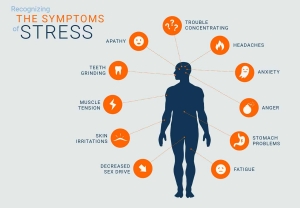According to a 2017 Gallup poll, 8 out of 10 Americans say they feel the effects of stress sometimes  or frequently during their day.
or frequently during their day.
Only 4% say that they never feel stressed.
Working long hours & sitting at a desk all day can cause muscle tension, headaches, fatigue & more.
Some stress is inevitable, but too much can lead to long term health problems.
This guide will teach you the top 12 mindful steps that you can take to reduce stress & anxiety and move through your work day with a sense of ease.
If you manage a team of employees, be sure to share this with them.
Learn to Recognize Stress when it First Appears

Here are the most common physical symptoms that you may experience due to stress.
Pay attention if you experience any of the symptoms below:
Physical Effects Of Stress:
- Frequent headaches
- Nausea and vomiting
- Muscle tension or weakness
- Reduced libido
- Teeth grinding
- Digestive troubles (e.g. diarrhea, constipation, stomach pain)
- Reduced energy
- Fatigue
- High blood pressure
- Dry mouth
- Tinnitus (ear ringing/whooshing/clicking)
- Decreased immunity
- Chest pain or heart palpitations
- Bingeing or eating less
- Insomnia or hypersomnia
Emotional Effects Of Stress:
- Decreased interest in activities or people
- Agitation and frequently snapping
- Moodiness
- Depression
- Anxiety
- Low self-esteem
- Negative mindset
- Feeling overwhelmed
- Hopelessness or loss of control
You don’t have to silently suffer.
Learning how to manage your stress takes practice, but here are 12 steps to help get you started.

1. Meditation
Meditation is a simple technique that anyone can learn.
It doesn’t require much time – you can start with just 10 minutes a day or a few times a week.
This simple act of sitting with attention on our breath can help reduce stress, alleviate anxiety & even improve cardiovascular health.
2. Spend Time in Nature
Whenever possible, take a short break during your workday to get out in nature, even if it’s just a short walk on a nearby trail.
If that isn’t possible, spend some time in nature on the weekend or a couple of evenings a week.
Hiking, biking or even just walking the dog can be great ways to leave our stressful day behind, deepen our breath and forget about our worries for a while.
While you’re out, stop and smell the roses.
Notice the birds, animals and even bugs that you see.
3. Take a Deep Breath
Slow, deep breaths are one of the fastest ways to stop stress in its’ tracks.
Deep breathing activates the parasympathetic nervous system and shifts us from “fight or flight” mode to a more relaxed state.
Anytime you feel stressed, breathe in slowly & deeply for five seconds, hold for five more and then exhale for a final five seconds.
Do this three times and you’ll immediately feel calmer.
4. Slow Down
Modern life is busy all the time, or so it seems.
One thing you can do to reduce stress during your workday is to simply slow down the speed at which you perform tasks and activities.
Try to find small ways you can slow down each day, such as:
- Leaving for work 20 minute earlier so you can drive in the slow lane.
- When you type on the computer, slow down, just a bit – and notice how the slower pace makes you feel.
- Break down larger tasks into smaller ones (For example, if you have 100 emails to answer, start with just 10.)
5. Try Yoga
Yoga is a great way to improve flexibility & strength.
It’s also one of the best ways to achieve a state of relaxation and reduce stress.
Some styles of yoga are more relaxing & gentle; others are more vigorous and energetic.
Try approaching your HR team to start a virtual or in-person yoga program for your work team, or check out free yoga videos online on websites like YouTube.
Try some of these simple yoga stretches that you can do right now at your desk with no special equipment or even having to change your clothing.
Each stretch is only 1-2 minutes & they are all very effective.
6. Exercise
Working out is one of the best ways to relax your body & mind.
Exercise also boosts our mood, helps us sleep better at night and can help us to feel more focused, energetic & motivated.
Find a way to stay physical by choosing a sport or activity that you love.
Start with just 30 minutes, three times a week.
Examples include walking, biking, hiking, swimming, running, pilates, dance, yoga & more.
7. Sleep
Everything seems more troublesome when we are sleep deprived.
If you aren’t getting enough shut eye on a regular basis, start to adapt good sleeping habits.
Turn off all electronics one hour before bed, darken your room with blackout curtains & aim for 7-8 hours of sleep each night.
Also, don’t use your bedroom for anything other than sex & sleep.
Practicing excellent sleep habits will have you feeling rejuvenated & better to handle the stressors of tomorrow.
8. Eat a Healthy Diet
Proper nutrition will support all of your cells & bodily functions, helping you be resilient, have more energy & better manage stress.
Choose a variety of fruits & vegetables every day as well as lean proteins, healthy fats, and grains like quinoa or brown rice.
Eat a moderate amount of sugar, salt & refined, processed foods and try to avoid eating out more than once a week.
Try to prepare a few foods at home once a week so you are organized for your busy week.
Chop up veggies and keep them in the fridge.
Prepare energy balls or healthy cookies or muffins and freeze any that you can’t eat right away for each access later.
Start with 1-2 small changes in your diet and go from there.
9. Time with Family & Friends
Life wasn’t meant to be all about work.
Set clear boundaries between your work day & family life, especially if you’re working from home at the moment.
If you have young children, make dinner with them, go for a walk in nature or cuddle & read stories with them at bedtime.
And don’t forget to schedule in a non-negotiable date night at least once a month with your partner – weekly if possible.
10. Time to Relax / Self Care
Experts say burnout isn’t caused by working long hours.
Rather, it’s caused by not having time after our workday to decompress & relax.
If you do have to work long hours, be sure to schedule some time to decompress at the end of your day.
Great ways to relax include walking in nature, taking a hot bath, reading, going for a massage, watching a movie & more.
Be sure to be kind to yourself and enjoy some self care time every time, even if it’s just 15 minutes a day.
11. Get Support
Make sure you reach out someone close to you when you are feeling stressed: your boss, a co-worker, family member or friend.
Ask them to coffee, lunch or just to chat over the phone.
Talking about our problems or how we feel can help us to immediately feel better.
Reach out to your network – they’re there to help.
If you need more help than family & friends can offer you, be sure to seek help from a therapist or counselor.
12. Have a Hobby
You need to set aside time for the things you love.
Try to do something every day that you really enjoying doing.
Examples include an art project, knitting or crocheting, cooking/baking, reading, gardening, repairing cars, playing board games & more.
Research shows that people with hobbies are less likely to suffer from stress, low mood & depression.
What did you love doing as a child?
Start there and try a few different things to discover what you truly love.
